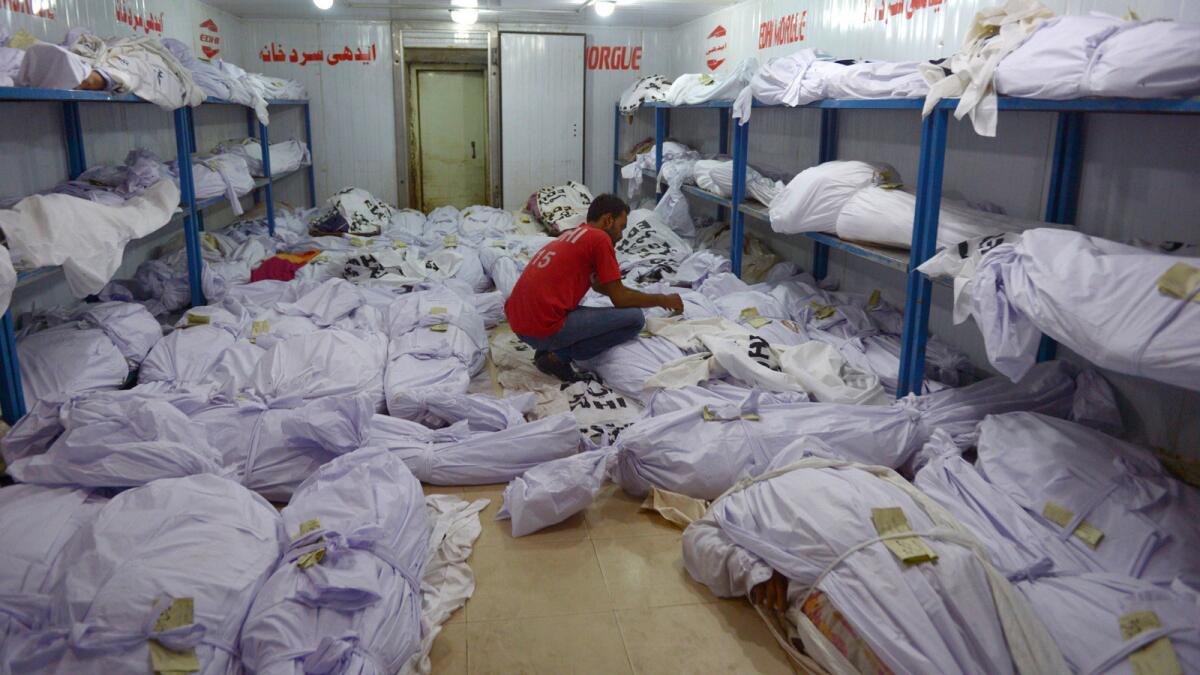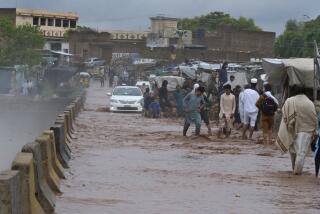Rain relief is coming as death toll nears 700 in Pakistan heat wave

A volunteer puts an identification paper onto the body of a heatstroke victim at a morgue in Karachi, Pakistan. A three-day heat wave has left nearly 700 dead.
Pakistani Prime Minister Nawaz Sharif declared an emergency Tuesday after a three-day heat wave left nearly 700 people dead in the southern port city of Karachi, the country’s largest city.
Health officials in Sindh province said that 218 people died of heat stroke on Tuesday alone, most of them elderly.
Temperatures have hovered near 110 degrees in the daytime after reaching a 10-year high of 113 degrees Saturday. Meteorological officials said that the lack of a sea breeze raised humidity and resulted in a heat index of 120 degrees.
Officials said they expected rain and slightly cooler temperatures in the coming days.
“Hopefully, today will be the last day of extreme heat in Karachi,” said Muhammad Hanif, a senior official with the government meteorological service. “Monsoon winds are expected to enter the southern parts of Sindh in the next 24 hours.”
The extreme heat came as Pakistanis were observing Ramadan, the holiest month of the Islamic calendar, during which devotees don’t eat or drink, even water, from dawn until dusk, although exceptions are allowed when a person’s health is threatened. A spokesman for the nonprofit Edhi Foundation, Anwar Kazmi, said he believed the Ramadan fast was contributing to the death toll.
The chief minister of Sindh, Qaim Ali Shah, said that schools, colleges and government offices would remain closed across the province but hospitals would stay open.
Morgues in the city were overflowing, with two facilities belonging to the Edhi Foundation having received about 500 corpses in three days, Kazmi said.
Karachi residents said the city’s crumbling infrastructure made it difficult to get relief from the temperatures, even after dusk. Many of the deaths were reported in the poorest pockets of the city.
“The heat wave coupled with long hours of power cuts and a crippled water supply system resulted in most of the deaths,” said Imdad Somoro, a senior journalist in Karachi. “The government has failed to provide basic utilities to the people of the city.”
A heat wave in neighboring India left nearly 1,700 people dead last month.
Sahi is a special correspondent. Staff writer Shashank Bengali contributed to this report from Mumbai, India.
ALSO:
Afghanistan’s new national hero: ‘Bang! Bang! Bang! I shot all six’
India heat wave becomes 5th-deadliest on record, killing more than 2,300
Terrorist attacks and their toll soared in 2014, U.S. reports
More to Read
Start your day right
Sign up for Essential California for news, features and recommendations from the L.A. Times and beyond in your inbox six days a week.
You may occasionally receive promotional content from the Los Angeles Times.






